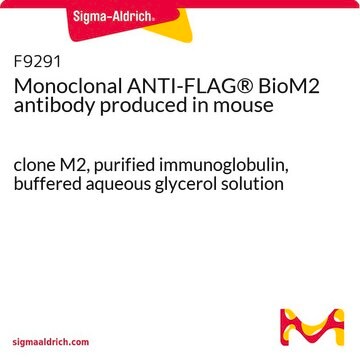F2922
Monoclonal Anti-FLAG® BioM5−Biotin antibody produced in mouse
clone M5, purified immunoglobulin, buffered aqueous solution
About This Item
Produtos recomendados
fonte biológica
mouse
conjugado
biotin conjugate
forma do anticorpo
purified immunoglobulin
tipo de produto de anticorpo
primary antibodies
clone
M5, monoclonal
forma
buffered aqueous solution
técnica(s)
western blot (chemiluminescent): 2 μg/mL
Isotipo
IgG1
Condições de expedição
dry ice
temperatura de armazenamento
−20°C
Descrição geral
Aplicação
The product binds the FLAG peptide only when it is located at the amino terminus preceded by a methionine. Binding is not Ca2+-dependent. It is useful for detecting cytoplasmically expressed Met-FLAG® fusion proteins in mammalian crude cell extracts, but not recommended for fusion proteins expressed in E. coli.
It can be used for immunodetection methods using avidin- or streptavidin-conjugated reporter enzymes such as streptavidin-peroxidase. Primary antibody conjugates are preferred when using murine cells as the recombinant protein host.
Browse additional application references in our FLAG® Literature portal.
Características e benefícios
forma física
Informações legais
Não está encontrando o produto certo?
Experimente o nosso Ferramenta de seleção de produtos.
Código de classe de armazenamento
12 - Non Combustible Liquids
Classe de risco de água (WGK)
WGK 3
Ponto de fulgor (°F)
Not applicable
Ponto de fulgor (°C)
Not applicable
Certificados de análise (COA)
Busque Certificados de análise (COA) digitando o Número do Lote do produto. Os números de lote e remessa podem ser encontrados no rótulo de um produto após a palavra “Lot” ou “Batch”.
Já possui este produto?
Encontre a documentação dos produtos que você adquiriu recentemente na biblioteca de documentos.
Nossa equipe de cientistas tem experiência em todas as áreas de pesquisa, incluindo Life Sciences, ciência de materiais, síntese química, cromatografia, química analítica e muitas outras.
Entre em contato com a assistência técnica








